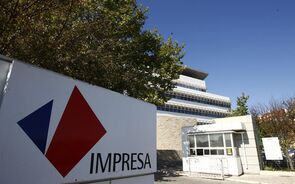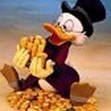Market Making
13 mensagens
|Página 1 de 1
Existem market makers em acções, e embora eles tentem fazer um hedge das suas posições (quando são obrigados a toma-las) esse hedge será sempre muito menos perfeito do que em derivados (onde para fazer o hedge se usa o subjacente).
O MM tenta, no mercado em acções, posicionar o título no preço em que as ordens de compra e venda se (relativamente) equilibrem, de forma a ganhar o spread com o menor risco possível.
Julgo que a maior parte do Market making se apoia na análise do Order Flow e não em charts ou fundamentais. È por isso que até se paga por order flow (por isso, e porque naturalmente num mercado equilibrado o order flow dá dinheiro).
É também por isto que análises de Money Flow tick a tick (uma aproximação ao order flow real) devem ser melhores para o trading de curto prazo do que AT ou AF.
O MM tenta, no mercado em acções, posicionar o título no preço em que as ordens de compra e venda se (relativamente) equilibrem, de forma a ganhar o spread com o menor risco possível.
Julgo que a maior parte do Market making se apoia na análise do Order Flow e não em charts ou fundamentais. È por isso que até se paga por order flow (por isso, e porque naturalmente num mercado equilibrado o order flow dá dinheiro).
É também por isto que análises de Money Flow tick a tick (uma aproximação ao order flow real) devem ser melhores para o trading de curto prazo do que AT ou AF.
- Mensagens: 3255
- Registado: 6/11/2002 19:27
Nos states existem market makers pelo menos no Nasdaq e no OTC BB
A sua função é providenciar liquidez permanente às acções
Teoricamente os market makers apenas deviam lucrar com os spreads bid/ask e não influenciar as cotações mas no caso do OTCBB os MMs influenciam ao máximo os movimentos das acções para não ficarem a arder com as explosões que todos os dias ocorrem nas pennies
O movimento dos market makers é possivel de observar nas cotações Level II onde eles estão alinhados no bid e no ask bem como as quantidades que cada um oferece
A sua função é providenciar liquidez permanente às acções
Teoricamente os market makers apenas deviam lucrar com os spreads bid/ask e não influenciar as cotações mas no caso do OTCBB os MMs influenciam ao máximo os movimentos das acções para não ficarem a arder com as explosões que todos os dias ocorrem nas pennies
O movimento dos market makers é possivel de observar nas cotações Level II onde eles estão alinhados no bid e no ask bem como as quantidades que cada um oferece
Obrigado a todos.
Encontrei um pequeno texto sobre o assunto. Cá vai:
I. What is market making?
Market making means that a trader or a company puts both buy and sell orders into the market, and wait for people to trade with him on either sides. In every market, price is quoted with both a bid and an offer price, with the latter a little bit higher than the former. Ordinary traders and investors "take the market," buying at offer price and selling at bid price. However, market makers could sell at offer price and buy at bid price. For example, imagine that the last price of XYZ stock is 10.00 and a market maker puts a 9.90 buy order and a 10.10 sell order into the market simultaneously. If someone hits him by selling at his buying price of 9.90, he gets a long position. If he thinks that the price of XYZ stock would rise further, he would hold the position for a while and square it at a higher price. If he is neutral or even bearish, he may sell the stock right away. If the price in the next second is 9.92 Bid/ 9.95 Offer, he may make the market again by putting a sell order at 9.95 and wait for somebody to buy from him, or just sell at 9.92 to take the market. Market makers trade from market fluctuation to make money. They like volatile rather than one-sided markets. If the market keeps rising or falling, they will run into the problem of taking positions that are against most people. Market makers don't care much about the long-term trend, or fundamentals, but focus on the short periods of abnormal price movement. They trade hundreds or even thousands of round-turns every day, and accumulate small gains into big profits.
Recently, more and more automatic trading systems have come into the scene. Usually, market makers have a "seat" in an exchange, which is a kind of membership through which they can enjoy lower commission and faster access to the market. As electronic trading becomes more popular, it will replace the conventional exchange-based out-cry market. The out-cry market is the traditional market where traders stand in the pit and trade with each other through hand signals and out-cries. EUREX, the electronic trading system for European futures products, has shown great success and has become the number one futures exchange within just one year of its launch. Internet stock trading has also attracted a lot of people due to its low commission rates. In the electronic world, market makers are most welcome, since they provide greater liquidity to the market and make price moves smoother. In some equities electronic trading systems, such as Archipelago and Island, market makers can even receive commissions for each act of market making.
Though market makers get some advantages over ordinary investors, they also have more obligations. Many exchanges require that market makers give price quotes in all kinds of markets, even when all the market participants want to trade the same way. From this angle, market makers serve as a lubricant for the market, as they absorb the extremely choppy price movement.
In the world of market making, "edge" is a key word. In the phrase "grasp the edge," edge means the difference between a security's real market price and its fair value. The task for market makers is to judge how much an edge would bring them both trading opportunities and profits. There are a lot of models and systems by which to judge the optimal edges. For example, if Cisco releases earning reports that are better than expected, market participants would jump into the market to buy Cisco stocks. Market makers would try to judge whether Cisco's stock price has risen too high in the most recent minutes through some fair-value models or chart analysis. If they believe that the price has been pushed high enough to justify a short-time retreat, they would begin to put sale orders into the market-with hopes that other traders would buy at their prices-and then square their short positions as soon as the expected retreat comes.
Encontrei um pequeno texto sobre o assunto. Cá vai:
I. What is market making?
Market making means that a trader or a company puts both buy and sell orders into the market, and wait for people to trade with him on either sides. In every market, price is quoted with both a bid and an offer price, with the latter a little bit higher than the former. Ordinary traders and investors "take the market," buying at offer price and selling at bid price. However, market makers could sell at offer price and buy at bid price. For example, imagine that the last price of XYZ stock is 10.00 and a market maker puts a 9.90 buy order and a 10.10 sell order into the market simultaneously. If someone hits him by selling at his buying price of 9.90, he gets a long position. If he thinks that the price of XYZ stock would rise further, he would hold the position for a while and square it at a higher price. If he is neutral or even bearish, he may sell the stock right away. If the price in the next second is 9.92 Bid/ 9.95 Offer, he may make the market again by putting a sell order at 9.95 and wait for somebody to buy from him, or just sell at 9.92 to take the market. Market makers trade from market fluctuation to make money. They like volatile rather than one-sided markets. If the market keeps rising or falling, they will run into the problem of taking positions that are against most people. Market makers don't care much about the long-term trend, or fundamentals, but focus on the short periods of abnormal price movement. They trade hundreds or even thousands of round-turns every day, and accumulate small gains into big profits.
Recently, more and more automatic trading systems have come into the scene. Usually, market makers have a "seat" in an exchange, which is a kind of membership through which they can enjoy lower commission and faster access to the market. As electronic trading becomes more popular, it will replace the conventional exchange-based out-cry market. The out-cry market is the traditional market where traders stand in the pit and trade with each other through hand signals and out-cries. EUREX, the electronic trading system for European futures products, has shown great success and has become the number one futures exchange within just one year of its launch. Internet stock trading has also attracted a lot of people due to its low commission rates. In the electronic world, market makers are most welcome, since they provide greater liquidity to the market and make price moves smoother. In some equities electronic trading systems, such as Archipelago and Island, market makers can even receive commissions for each act of market making.
Though market makers get some advantages over ordinary investors, they also have more obligations. Many exchanges require that market makers give price quotes in all kinds of markets, even when all the market participants want to trade the same way. From this angle, market makers serve as a lubricant for the market, as they absorb the extremely choppy price movement.
In the world of market making, "edge" is a key word. In the phrase "grasp the edge," edge means the difference between a security's real market price and its fair value. The task for market makers is to judge how much an edge would bring them both trading opportunities and profits. There are a lot of models and systems by which to judge the optimal edges. For example, if Cisco releases earning reports that are better than expected, market participants would jump into the market to buy Cisco stocks. Market makers would try to judge whether Cisco's stock price has risen too high in the most recent minutes through some fair-value models or chart analysis. If they believe that the price has been pushed high enough to justify a short-time retreat, they would begin to put sale orders into the market-with hopes that other traders would buy at their prices-and then square their short positions as soon as the expected retreat comes.
Então peço desculpa, mas de facto desconhecia a existência de market makers em acções, nunca tinha ouvido falar.
Obrigado pelo reparo,
Cumprimentos
Obrigado pelo reparo,
Cumprimentos
O verdadeiro caracter de um Homem vê-se pelo modo como trata alguém que não lhe vai dar absolutamente nada!
- Mensagens: 335
- Registado: 18/12/2002 16:30
- Localização: Seixal
Boas,
Não sou concerteza a pessoa indicada para responder a essa questão, sei que no caso das opções/warrants fiz um trabalho para uma cadeira que consistia protejer as posicões através um processo dinamico, penso que se chamava "Delta Neutral hedje"(não me recordo muitos pormenores-ainda tenho uma folha em Excel com isso).
No caso dos CFD, pelo que sei é um produto que não oferece direitos/opções em ralação ao subjacente, partindo daqui não me parece que seja possível uma cobertura em termos directos com o subjacente.
Não sou concerteza a pessoa indicada para responder a essa questão, sei que no caso das opções/warrants fiz um trabalho para uma cadeira que consistia protejer as posicões através um processo dinamico, penso que se chamava "Delta Neutral hedje"(não me recordo muitos pormenores-ainda tenho uma folha em Excel com isso).
No caso dos CFD, pelo que sei é um produto que não oferece direitos/opções em ralação ao subjacente, partindo daqui não me parece que seja possível uma cobertura em termos directos com o subjacente.
heterocedastico Escreveu:Exactamente Marco. Por exemplo, no caso do warrants, sempre que um market maker vende call warrants e portanto fica exposto face às subidas deste activo, tem de ir ao mercado e comprar x acções do activo subjacente (tendo em conta o delta do warrant) para cobrir a sua posição.
Agora, e no caso do market making de acções (que evidentemente não possuem activo subjacente), como é que é feita a cobertura da posição do market maker? Será que recorrem ao mercado de futuros?
E para os CFD's?
Relativamente aos CFD's, creio que se passa de forma idêntica aos warrants.
Relativamente às acções a função deles é garantir liquidez, reduzir spreads e «atrair negócio».
A actividade funciona de forma ligeiramente diferente e eles acabam por funcionar como intermediários entre investidores (uma actividade que os aproxima da arbitragem). Eu dou um exemplo exagerado: imaginemos que temos uma acção com comprador a 10€ e vendedor a 15€. Com esta disparidade não há encontro de compradores e vendedores. Vai daí o MM coloca por exemplo compra a 12 e venda a 13€. Ora, com estes valores já haverá talvez quem compre (em vez de 15€ já pode comprar a 13€) e quem venda (em vez de só poder vender a 10€ já pode vender a 12€). Assim, o Market Maker criou negócio onde não havia nenhum (daí o termo Market Maker - criador de negócio) e ganhou a diferença (vendeu a 13 e comprou a 12).
Alguém mais familiarizado com estas actividades poderá dar uma explicação mais completa, mas de forma sucinta é isto.
FLOP - Fundamental Laws Of Profit
1. Mais vale perder um ganho que ganhar uma perda, a menos que se cumpra a Segunda Lei.
2. A expectativa de ganho deve superar a expectativa de perda, onde a expectativa mede a
__.amplitude média do ganho/perda contra a respectiva probabilidade.
3. A Primeira Lei não é mesmo necessária mas com Três Leis isto fica definitivamente mais giro.
Voces não podem afirmar que não existem market-makers de acções com tanta certeza. Essa entidade existe. Vejam por exemplo o trading em ALS tem um MM permanente. Este tipo de intervenientes no mercado de acções tambem já existiram no nosso mercado, o BCP tinha, a SON tambem, mas fruto da falta de liquidez do nosso PSI, acabava por estar so o MM e acabar por gerar liquidez mas nao atraia investidores.
"Quem comprou, comprou. Quem não comprou, comprasse."
PekenoBuda Escreveu:Não existem market makers em acções.
Atenção, nos estados unidos existem.
FLOP - Fundamental Laws Of Profit
1. Mais vale perder um ganho que ganhar uma perda, a menos que se cumpra a Segunda Lei.
2. A expectativa de ganho deve superar a expectativa de perda, onde a expectativa mede a
__.amplitude média do ganho/perda contra a respectiva probabilidade.
3. A Primeira Lei não é mesmo necessária mas com Três Leis isto fica definitivamente mais giro.
Exactamente Marco. Por exemplo, no caso do warrants, sempre que um market maker vende call warrants e portanto fica exposto face às subidas deste activo, tem de ir ao mercado e comprar x acções do activo subjacente (tendo em conta o delta do warrant) para cobrir a sua posição.
Agora, e no caso do market making de acções (que evidentemente não possuem activo subjacente), como é que é feita a cobertura da posição do market maker? Será que recorrem ao mercado de futuros?
E para os CFD's?
Agora, e no caso do market making de acções (que evidentemente não possuem activo subjacente), como é que é feita a cobertura da posição do market maker? Será que recorrem ao mercado de futuros?
E para os CFD's?
Tanto quanto eu sei tudo o que é market making e arbitragem são sectores de mercado onde a exposição no mercado é praticamente nula, ou seja, envolvem cobertura de risco pelo que aquele que desenvolve esta actividade não ganha nem perde na evolução do activo em si mas antes em pequenos diferenciais como spreads e diferenças de cotações em diferentes mercados.
FLOP - Fundamental Laws Of Profit
1. Mais vale perder um ganho que ganhar uma perda, a menos que se cumpra a Segunda Lei.
2. A expectativa de ganho deve superar a expectativa de perda, onde a expectativa mede a
__.amplitude média do ganho/perda contra a respectiva probabilidade.
3. A Primeira Lei não é mesmo necessária mas com Três Leis isto fica definitivamente mais giro.
Market Making
Alguém me sabe dizer se os market makers de acções fazem algum tipo de cobertura de poisições, tal como fazem os market makers de warrants? Se sim, como é que funciona? E os market makers de CFD's?
Obrigado.
Obrigado.
13 mensagens
|Página 1 de 1
Quem está ligado:
Utilizadores a ver este Fórum: AAA_, alentejo41, Carrancho_, Google [Bot], Kury Yozo, m-m, malakas, MarketGodzilla, MR32, nunorpsilva, O Magriço, PAULOJOAO, paulopereira.pp36.pp, PMP69, SerCyc, Shimazaki_2, trilhos2006, VALHALLA, yggy e 137 visitantes



